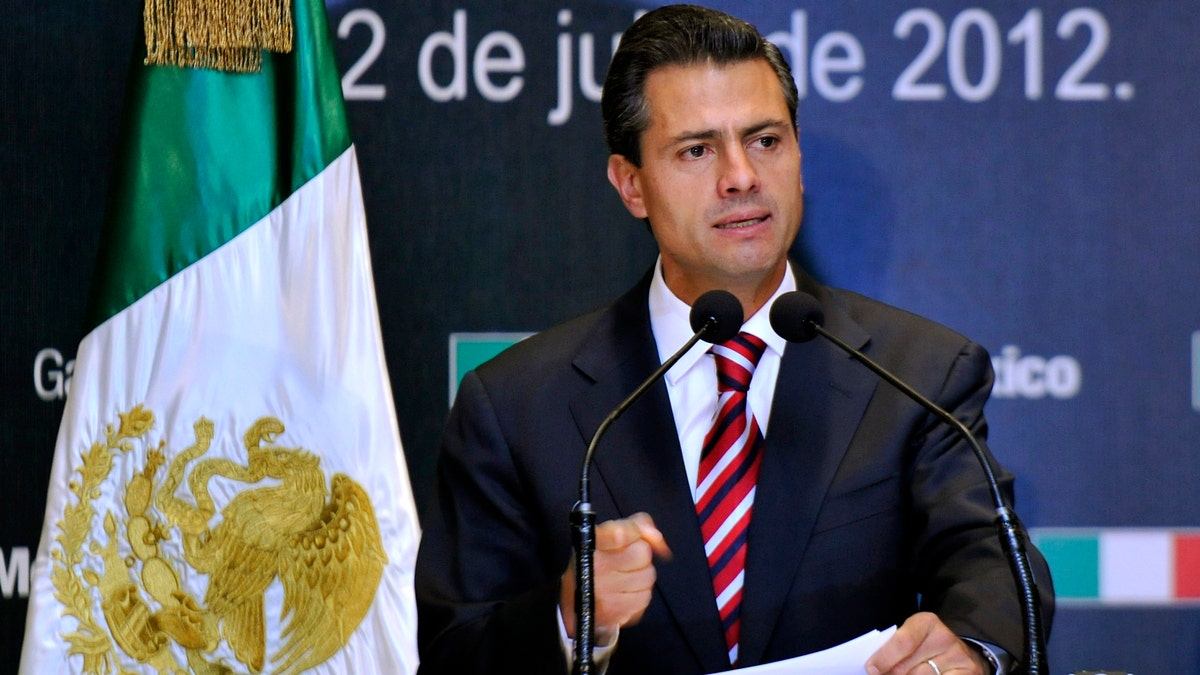
MEXICO CITY, MEXICO - JULY 2: Presidential candidate Enrique Pena Nieto of the Institutional Revolutionary Party (PRI) speaks during a press conference on July 2, 2012 in Mexico City, Mexico. According to reports, a vote count by the independent Federal Electoral Institute (LIFE) has give Pena Nieto and the PRI the win in the presidential election, but it looks unlikely the will have a majority in either house of Congress. (Photo by Daniel Aguilar/Getty Images) (2012 Getty Images)
A slew of proposed governmental reforms and a rise in murders countrywide have marked the first 100 days in office for Mexico’s new president Enrique Peña Nieto.
Despite campaigning heavily on the issue of public security, Peña Nieto has spent most of his time in office so far dealing with the thorny issue of reforms to the country’s educational, telecom and energy industries. This focus away from the drug war –the keystone of former President Felipe Calderón’s administration– could signal a shift in Mexican politics toward an enhancement in social services, or a reversal to hiding the drug problem in the country.
“He’s getting more done than expected,” Todd Eisenstadt, a professor of government at American University, told Fox News Latino about Peña Nieto’s first 100 days, but added that his policy toward the drug war is still not clear. “He may be reverting to the old system in which president’s turned the other cheek.”
Peña Nieto’s political party, the Institutional Revolutionary Party (PRI), held the Mexican presidency for 71 years, until Vicente Fox of the National Action Party won the 2000 election. Under the PRI, there was widespread corruption and collusion between the country’s drug cartels and political figures who ostensibly allowed drugs to flow through the country while keeping the amount of violence related to the trade at a minimum.
The murder rate for the first 100 days is not a good measure of a presidency...You have to give some time for him to implement the policies and then some more time for the policies to take effect.
During the first days of his presidency in 2006, Felipe Calderón declared an all-out offensive on Mexico’s cartels. In the ensuing six years, his “kingpin” approach killed or detained many high ranking cartel leaders, but also saw a drastic escalation in drug-related violence.
During Calderón’s six years in office, an estimated 70,000 people died in violence related to the country’s drug war.
Besides the death toll, Mexico’s cartels – and with them, violence – have spread from certain regions along the U.S.-Mexico border to other parts of the country once free of violence, including resort areas such as Acapulco and metropolitan hubs like Monterrey and Guadalajara.
Peña Nieto campaigned on a promise of reducing violent crime among Mexico’s citizens while moving away from the tactics employed under Calderón.
So far this strategy has not worked out well, with some 2,882 people being killed in his first one hundred days in office –including 100 soldiers and police officers– compared with 2,338 people in the last hundred days of Calderón’s administration.
Mexican experts, however, argue that it is too early to judge Peña Nieto’s strategy as his policies have not been completely enacted and he has yet to appoint some of the members of his cabinet.
“The murder rate for the first 100 days is not a good measure of a presidency,” said Christopher Wilson, an associate at the Mexico Institute of the Woodrow Wilson International Center for Scholars. “You have to give some time for him to implement the policies and then some more time for the policies to take effect.”
The first policy issue that Peña Nieto confronted when he moved into the president’s residence at Los Pinos was education.
In December, Congress passed a new law aimed at regaining control of the education system by the state and limiting the power of the National Union of Education Workers (SNTE). The law created an autonomous body for teachers’ evaluations in order to encourage the professionalism and remove the influence of the SNTE.
It also established a census to determine the exact number of teachers, students, and schools in Mexico, as this is information not currently available.
This move was followed by the arrest in February of longtime SNTE union boss Elba Esther Gordillo on charges of embezzling millions of dollars from the country's teachers union to pay for an opulent lifestyle.
Gordillo, dubbed “Jimmy Hoffa in a skirt,” is accused of embezzling 2 billion pesos (about $160 million) from union funds. She has been replaced by Juan Diaz de la Torre, who was second in command of SNTE before Gordillo’s arrest.
“He’s gotten off to a fast start, especially with the incarceration of Esther Gordillo,” said George W. Grayson, a Mexico policy expert at the College of William & Mary. “I think this will be a good year for him.”
Grayson cited Peña Nieto’s willingness to surround himself with experts in fields he's not familiar with as a positive sign for his presidency, especially as he tries to tackle the privatization of the country’s oil industry and break apart the purported telecommunications monopoly of Carlos Slim.
“His strong suit is that while he may not be a political Einstein, he knows what he doesn’t know,” Grayson said. “He’s not afraid to fill in the gaps when he knows he lacks the knowledge.”
